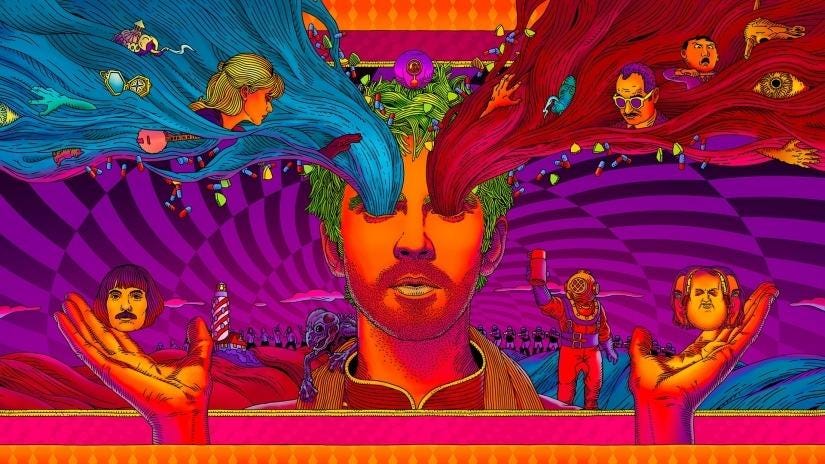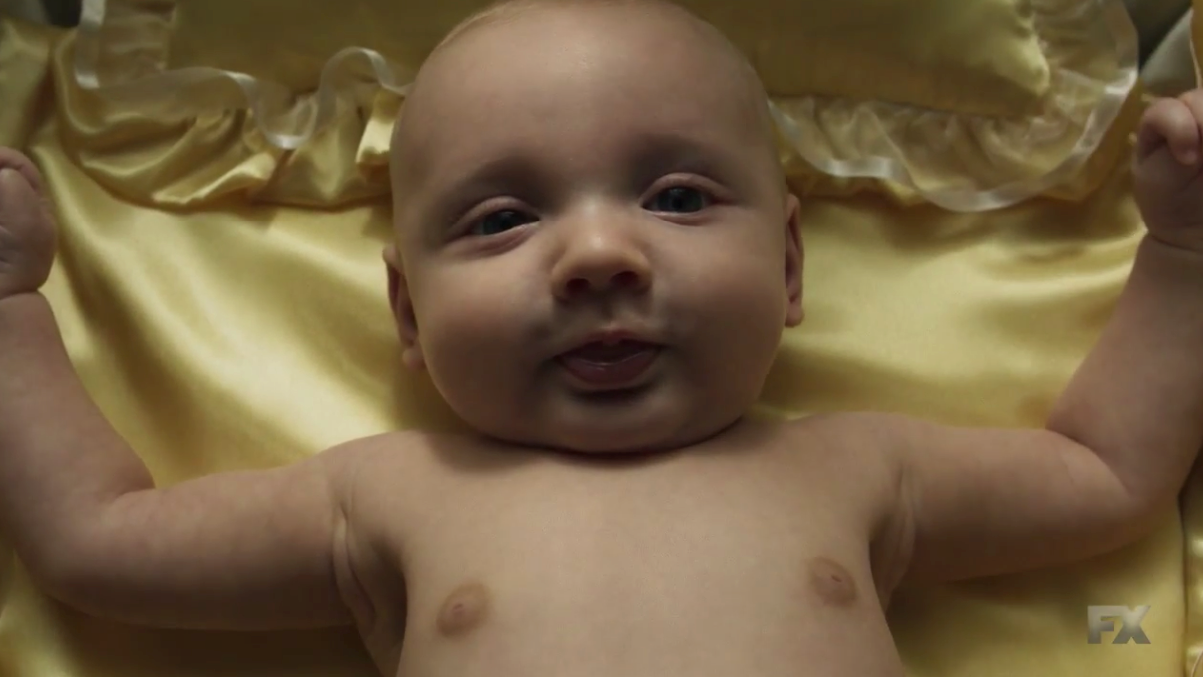
SPOILER ALERT! Major plot points of seasons 2 and 3 of Legion are discussed below.
When this final season of FX Network’s Legion began, the previewers told us this was a story about time travel. That’s certainly a big part of it, but now that the last episode has aired, the more important thematic take away for me was about ‘mommy’ and ‘daddy’ and all that is conjured by those two simple and complicated concepts.
First, telling a story well, whatever the story, involves communication aimed at all the senses. That’s not so easy with a TV show where only our ears and eyes are open for business (smell-O-vision, anyone?). But I think show-runner Noah Hawley had the right idea about the very unique comic-book adaption Legion, which just wrapped up on the FX network a couple nights ago. This show, unlike, say, ‘Better Call Saul’ draws so much attention to its production that it risks distracting from the story. Maybe that’s by design, as the story of Legion‘s final season involves a lot of time travel, plus a land between time, plus the Astral Plane, plus three new characters who are REALLY important. Lots of stuff going on.
Do the audio and visual elements help explain the story? Or does the story provide a playground for the outrageous production? Or does it even matter?
Well, yes and no. If the viewer has absolutely no idea about the plot and where their sympathies should lie, then there will be zero investment. It will be like looking at a pretty rock.
The good news is that Legion season three does a decent job of telling the story of how David Haller, an omega-level mutant with unimaginable power, realized, to some extent, that he had become a force for evil, and sought to go back in time to change his behavior and save the world. There really isn’t too much more you need to know.
That basic framework is the sandbox in which this show successfully plays with ideas of love and family. The time-bending plot and the over-the-top production cause a different kind of confrontation with those issues, fusing the universal with the inexplicable.
Song and Dance
One of Legion’s calling cards is the fabulous musical set pieces. In the very first episode of Legion ever (S01e01) we got a sensational Bollywood dance tribute. Earlier in this season we had a somber and beautiful sing-a-long with “(What’s So Funny ‘Bout) Peace, Love and Understanding.” And for our big send off, we get David and his young mum Gabrielle performing a duet of Pink Floyd’s “Mother.”
Hush now baby don’t you cry
Mama’s gonna make all of your
Nightmares come true
Mama’s gonna put all of her fears into you
It’s a brutal note, but fortunately not the one the series wrapped up with. Still, the mommy pain is important as it comes, in part, from David’s being adopted. He has felt abandoned and unloved his whole life. Mix that with probable mental illness he inherited from Gabrielle, and his near god-like abilities, and the fact that he was basically inhabited by a malevolent demon for most of his life, David is deeply damaged goods.
Bad David
Much of the third season is about the cult that David forms, planting the seed of love (and desire) in all of his attractive adherents. They call him “Daddy.” It’s creepy as fuck, especially considering this is an expanded version of the power he used to rape Sydney (ex-girlfriend) in the second season. That particular horror was so effective because the viewer had no idea how bad David’s action were while they were being depicted. Wait a minute, is this… ?Is he…? Did he just…?
Syd is much more than just the ex-girlfriend, of course. She is, in effect, the true protagonist through most of Season Three. Her backstory deeply concerns being raised by her wealthy single mother, and she has her own formidable mutant power to manage. As David tries, and fails, to get from Syd the love he was denied from his biological mother, Syd refuses to conform herself to the reality David needs. It is the one place where he is powerless.
My Three Dads
And of course we have dad, or should I say dads. There is Charles Xavier, himself a super mutant and David’s biological father. There is Amhal Farouk, the demon mutant secretly living inside of David for over thirty years, and then there is young Amhal, before he lost a telepath battle with Charles and subsequently infected the son for revenge. Current day Amhal explicitly takes credit for raising David and says he loves him. These four clash beautifully at the end, each with their unique point of view on the matter at hand (saving/controlling the world), but it is a clash of wits and words, using, as the show always has, cheap practical effects to effectively suggest other times and dimensions.

We see Charles and David working together as a mutant super-force, maybe for good. We see Charles and current-day Amhal trying to bury the hatchet in the astral plane. We see David trying to murder young Amhal before he has a chance to infect. It all ends in a dramatic and satisfying truce where maybe, just maybe, all the adversaries understand each other a little better.
Love Doesn’t Always Win
And then we are left with Syd and David and baby David. An appropriately fucked-up version of the nuclear family based on what Legion has provided so far. As they await their trip to oblivion that a new timeline will bring, they look down at the baby and he is their baby. In the characters’ final exchange, there is dulled pain, acceptance, and sadness, but not despair. David is his narcissistic self: “I have to say, I didn’t think you’d help me [change the timeline, save the world, whatever]. Syd responds, looking down at baby David: “I didn’t. I helped him.” She then tells adult David to “Be a good boy,” and we see the baby, smiling just as he did in the first episode of the series, Syd and David disappear (as parents do), cue the ‘Happy Jack’ and we’re out.

It’s a bit frustrating because, as the same Pink Floyd song asks:
Ooooh aah, is it just a waste of time?
So, there’s ample reason to think maybe this will all repeat. I’m not too worried about that, though. We had three seasons of emotional, fun and risk-taking TV. So, whatever conspiracy theories may arise from the actual ending of Legion, I’m not too broken up if this is really it.
As a parent, I greatly appreciated the reconciliation between time traveler Switch (who sort of made this whole mess possible) and her father. This was an emotional catharsis that I needed to not be so overwhelmed by the uncertainty and sadness of the main story lines. Switch was a new character appearing only the last season and still, with limited screen time, was able to make a tremendous impact. The same can be said for David’s parents Charles and Gabrielle. They are new, yet pivotal. Somehow, without the prior seasons for development, and competing for screen time in the current season, they are still able to make sincere contact with the viewers’ emotions. It’s a great testament to the writers and performers.
The Impenetrable Beauty of Love
Two characters who both embody and transcend the parent/child relationship are Carey and Carey. They get an elegiac ending that is supremely fitting for their one-of-a-kind connection. She calls him “old man” and he says that doesn’t work any more because she has now caught up to, and surpassed, him in age. Then she says: “Then how about ‘brother’?” and Carey responds: “That works, my lover. That works.”
There are aspects of love that make no sense and can never be put into words. That’s why sumptuous productions and big musical montages are so important. You can’t just do it with words. But we need words, even when they will never be adequate. Ultimately we have to go with what works.
And maybe that’s a better place to stop with Legion. It’s colorful and crazy and pretentious and over, but that works.
